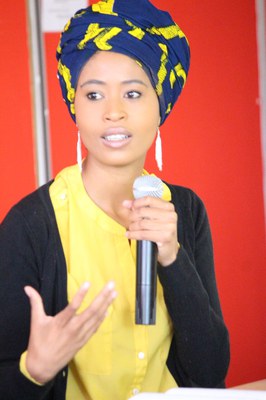The women at the packed event demanded greater focus on violent crimes against women, increased accountability for action and the need for solidarity to challenge the status quo. They called on all women to break the silence and “name and shame” rapists and perpetrators of violence. They also proposed a social movement of young Black women in particular to demand change in how women are treated and to bring an end to violence against women.
“We speak on behalf of young women, we don’t let them speak for themselves,” said Soul City Institute’s executive Global Fund (Young Women and Girls) programme, Phinah Kodisang, as the #SexualViolenceAndVoice dialogue with young women kicked off. She noted that 53 617 sexual offences were reported to police in 2014/2015 but that, as many rapes were unreported, the number of rapes could be as high as 482 000.
Rise Club members Unathi Maphipha and Thakane Mashala told how they had taken action within their communities to tackle violence. Maphipha described how her community rallied when a young woman was raped and organised a march to the local police station to force the police to respond.
Her colleague Mashala explained: “Women had to march because we wanted to let them know that this is happening in our community.”
#Iamoneinthree activist Tsephiso Maleswena said the Kwezi trial (in which President Jacob Zuma was accused of rape) showed that young black women are on their own: “The issue of rape is not important in this country,” said Maleswena.
She later said some women themselves could perpetuate the system of patriarchy. “You can perpetuate a racist system even if you are black; in the same way patriarchy survives with the support of some women.”
She cited examples of when aunts asked why the niece reporting rape was alone with an uncle; the mother asking “what were you wearing when you were raped”.
“The uncle accused still attends weddings and funerals. Nobody treats them differently. Instead its
the young woman who accuses who is problematised. It happens at homes, it happens at schools, it happens at university,” she noted.
Student activist Simamkele Dlakavu who participated in various student movements such as the #Iamoneinthree said “hashtags are good but what happens on the ground afterwards is critical”.
“I want us to use anger. I want us to be angry enough so that we revolt, so that rape in this country is no longer okay,” said Dlakavu.
Many participants pointed to the justice system and the need to improve how crimes against women were handled.
“I get tired when we speak about that legal system and how our sisters are being treated,” said Maleswena, adding that rape was not seen as a serious crime.
“We don’t have to march for house robbery. Why must we march for rape?” asked Maleswena.
Women from the floor gave examples of how rape survivors were made to feel as if they were the problem.
A number of attendees told stories of how they were attacked with little support from their communities: “When I got to the police station, the police laughed at me. It was not rape, they said,” recalled one woman.
After joining the Rise Club, she decided to speak out: “I refuse to be silent,” she said.
Another recalled how her sister was raped at the age of 10. When they eventually reported the rape, they incurred the ire of the community instead of being supported. The lack of available counselling for victims or survivors and the lack of funding for organisations providing such services came up repeatedly in the discussion.
“We ask the nation to stand up for women,” said one speaker from the floor.
Among the suggestions for future action was a programme to link parents to young children to talk about such issues; taking activism to churches to challenge patriarchy; and, a challenge to the Sexual Offences Act e act to improve the response to reported cases.

